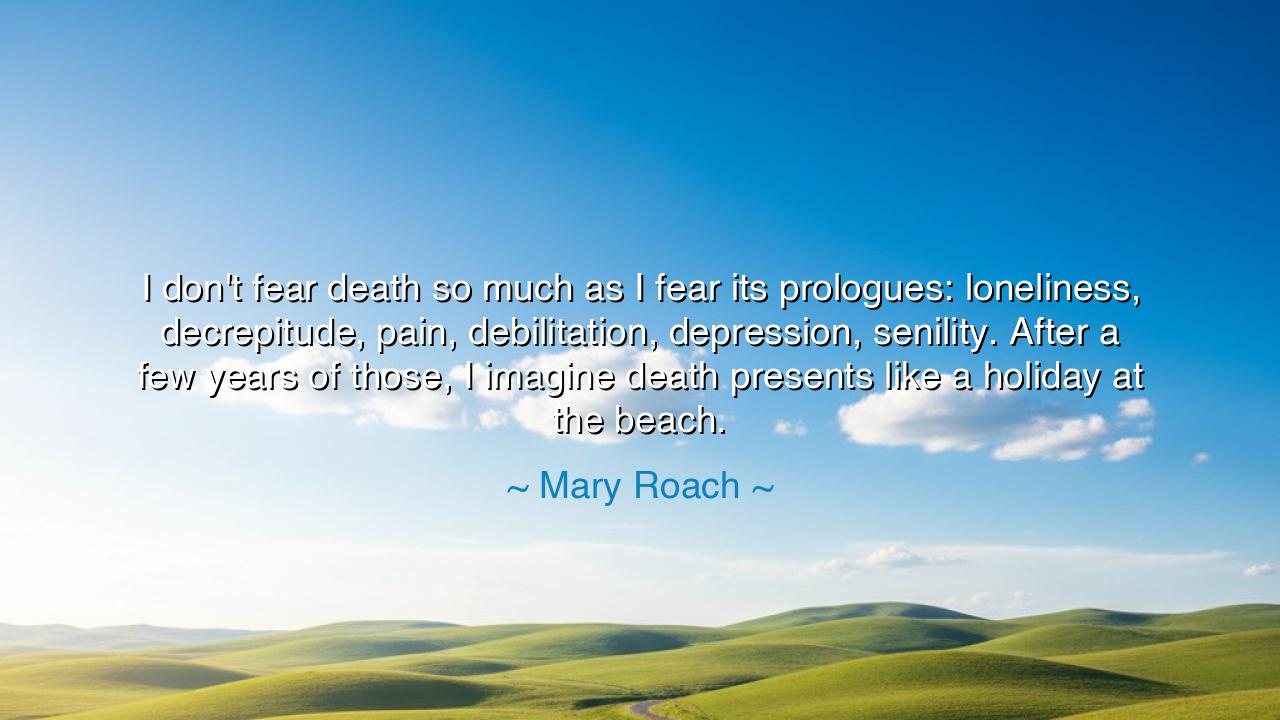
I don't fear death so much as I fear its prologues: loneliness
I don't fear death so much as I fear its prologues: loneliness, decrepitude, pain, debilitation, depression, senility. After a few years of those, I imagine death presents like a holiday at the beach.






The words of Mary Roach — “I don't fear death so much as I fear its prologues: loneliness, decrepitude, pain, debilitation, depression, senility. After a few years of those, I imagine death presents like a holiday at the beach.” — strike with the honesty of a soul that looks unflinchingly upon the truth of mortality. In her words, there is no melodrama, no denial — only a clear-eyed acknowledgment that death itself is not always the greatest terror, but rather the long and painful approach to it. She names what so many conceal behind silence: the dread not of the end, but of the slow unraveling that may precede it. Yet in her wit, there is also wisdom — for she reminds us that even the fear of death can be softened when life has already worn away its sharp edges.
Mary Roach, a writer known for her curiosity about the strange, scientific, and macabre, often explores subjects others dare not touch — the body, decay, the afterlife, and all that lies between. But in this reflection, she speaks not as a scientist, but as a philosopher of the human condition. Her tone is half humorous, half mournful — as though she has glimpsed the truth that all mortals eventually face: that the passage into death is not one swift door, but a corridor lined with the shadows of loneliness, frailty, and loss. She captures the paradox of aging — how one can cling to life while also growing weary of its burdens, until the idea of rest, even in death, begins to resemble peace.
Her words remind us that the ancients, too, contemplated this same truth. Seneca, the Stoic philosopher, wrote that “it is not death that a man should fear, but never beginning to live.” Yet even the Stoics, who prized courage and calm before fate, feared the diminishment of the self — the loss of mind, the decay of dignity. The prologues to death, as Roach calls them, are the real crucible of the spirit. For when the body weakens and the mind falters, the soul must wrestle not only with mortality, but with meaning. It is there, in the twilight between life and death, that the true test of endurance begins.
Consider the story of Leonard Woolf, husband to the writer Virginia Woolf. As he watched his beloved wife slip into the depths of depression and despair, he came to understand that pain of the spirit can be far more devastating than death itself. Virginia feared not dying, but living in torment — in the endless fog of mental anguish that stripped life of color and joy. Her death, though tragic, was also her release. It is this bitter paradox that Roach captures: that when the prologue of suffering grows too long, even death may appear as a mercy — a holiday at the beach, gentle and bright after years of darkness.
Yet let us not hear Roach’s words as an ode to despair, but as a call to awareness and compassion. She speaks truth not to glorify death, but to remind us to cherish vitality while we have it — to care for the aged, to comfort the lonely, to bring light into the twilight years of others. For the fear of the prologues of death arises not from death itself, but from abandonment — from being left unseen, unheard, or unloved as the body falters. To live well, then, is not only to prepare for one’s own end, but to ensure that others need not face their own with fear and isolation.
In her wisdom, Mary Roach reveals that death, when stripped of pain and loneliness, can indeed resemble peace — a homecoming after a long journey. The terror of death fades when life has been lived fully, when one’s heart has been open, when one has given and received love without measure. It is not death we must battle, but the erosion of the spirit before it. The antidote to this erosion lies in connection — in laughter, in kindness, in purpose that endures even as strength fades.
So take this teaching to heart, O seekers of meaning: do not fear the end, but fear the unlived day. Fear the cold heart that withholds compassion, the busy life that forgets the frail. Live now, so that when your final rest arrives, it comes not as a stranger, but as a friend. Let your life be so rich with presence, with love, with gratitude, that when you finally slip into that last ocean of stillness, you may indeed find it to be what Roach imagines — a holiday at the beach, where the soul at last can breathe, unburdened, and the waves of eternity whisper, welcome home.






AAdministratorAdministrator
Welcome, honored guests. Please leave a comment, we will respond soon